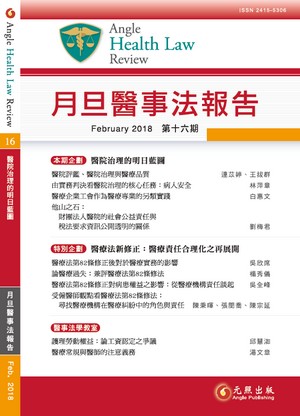論醫療過失:兼評醫療法第82條修法【特別企劃】 試閱
Medical Negligence: A Few Comments on the Newly Revised Article 82 of Taiwan’s Medical Care Act
醫療過失係用以判斷醫療民事上與刑事上之傷害責任時的一個重要構成要件,但究竟醫療過失的內涵為何,實務及學說上一直沒有系統性的譜系架構,每每在醫療糾紛的相關探討上,各自援引源於日本法的「醫療水準」、美國法的「醫療常規」,以及臺灣學者自創的「專業裁量」等,試圖進一步來輔助醫療過失有無之判斷,然而這些概念到底所指為何?彼此關聯性為何?2017年年底,醫療法第82條新修法,企圖使醫療責任更加明確,故在一個法條中,立法者同時使用「過失」、「專業裁量」、「醫療水準」、「醫療常規」等名詞,其結果是否將如醫界所沾沾自喜,使得醫療重大過失概念明確化?還是如多數司法實務人士以為,根本沒有改變現狀?為免治絲益棼,淪為各界各說各話,本文扼要整合醫療過失之學說與實務,彙整出醫療過失概念表,以求正本清源。
Medical negligence is the core concept to determine either civil or criminal liability for medical malpractice in Taiwan. What actually constitutes negligence is, however, in lack of systematic studies. Sub-concepts such as “medical level,” originated from Japan law, “medical custom” from the American law, or “professional discrtion” invented by Taiwanese scholars are widely used in relating discussions. To what do these concept refer? How do these concepts connect with each other? Article 82 of the Medical Care Act was revised on December of 2017 and all these terms are used in the same article. Does this help in bringing a clearer concept of “gross negligence” like the medical professions hoped, or it simply keeps the status quo unchanged like the legal profession assumed? This paper tries to delineate a concept flow chart of medcial negligence by carefully compare the relevant concepts so that we might have an informed discussion on medical negligence in the future.
067-082






